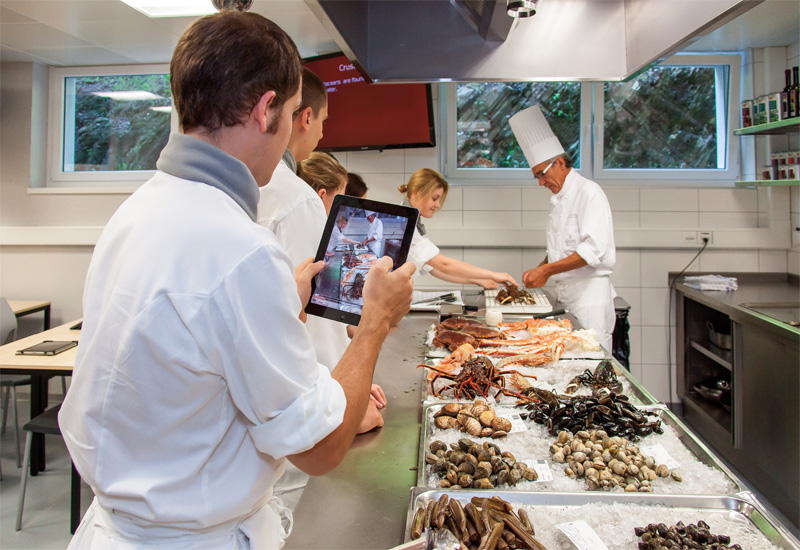In Practice
César Ritz Colleges claims to be the first hotel management school in Switzerland to have embraced the new technology and following the success of the experience, it is set to be introduced to other schools in the Swiss Education Group network over the coming years.
“The iPad has brought to César Ritz Colleges a new level of interactivity and the amazing opportunity for students and staff alike to be involved in the creation of inspiring, up-to-date and instantly relevant information for the hospitality and tourism industry,” comments Fitzgerald.
“We have seen fantastic use in all subjects from accounting to service and just how it is used is being driven by the students and their teachers,” he added.

| Advertisement |
Zeynep Jaggi, who lectures at the Lucerne campus, says the usage of iPads in the classroom has been a positive experience overall.
“It has helped reduce an incredible amount of paper waste and reduced the time
invested in photocopying to zero — I can invest my time more effectively on other things.
It has provided students a good chance to combine the usage of technology in class with learning practices. One of the best examples of that is the usage of videos in public-speaking classes and a specific example is the TED talks.
The students have the chance to bookmark, share and watch videos either in the classroom or outside of the class as a listening and speaking activity. Another example is TEDed that I have recently started to use.
“What is more, the students do not have to carry around different books to each class since the iPad is the main tool that we use. This avoids the situations that people forget books or materials in the class or simply lose them. And the best of all, you can really create dynamic and creative classes for all your courses with different apps,” he adds.
However, on a recent visit to Dubai for the International Panel of Experts Forum at the Emirates Academy of Hospitality Management, commenting on the initiative, Fitzgerald revealed that not all of the faculty staff had warmed to the idea of scrapping the traditional textbook way of learning.
The results to date
However, six months after the start of the iPad revolution, the feedback from students and staff alike has been very positive, according to Fitzgerald.
César Ritz Colleges bachelor student Felix Münch says: “The iPad makes studying more convenient. It is very simple to use, especially for students who are not very into technology.
It is a first step of showing how later in our careers everything will be connected and communicated through devices like the iPad. And we have the possibility to grow together with the technology.
“Studying is still as hard as it was before, but I am sure that in the future handheld devices will take over in many business areas, and make them as convenient as in the education sector,” adds Münch.
According to Fizgerald, staff who saw the iPad as “just a fancy replacement for textbooks” have discovered that the possibilities are much greater.
Bjorn Lutz, who also lectures at the Lucerne campus, says the iPad opens up new perspectives and adds a new dimension of interactivity to the learning and teaching experience in the classroom environment.
“Learning a new language, working with vocabulary and grammar and looking up new words, the ipad facilitates the preparation of wordlists, quizzes and allows students to share and show their presentations and results via Apple TV in an instant.”
Ultimately, the iPad has transformed the way that many classes are run and the course content being produced by lecturers is constantly being updated and improved.
Article continues on next page ...









 Search our database of more than 2,700 industry companies
Search our database of more than 2,700 industry companies









